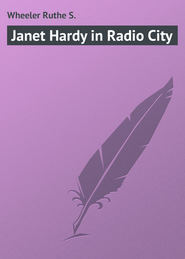По всем вопросам обращайтесь на: info@litportal.ru
(©) 2003-2024.
✖
Helen in the Editor's Chair
Настройки чтения
Размер шрифта
Высота строк
Поля
“Paper doesn’t cost quite as much,” explained Helen, “and we’re passing the saving on to you. Be sure and tell your neighbors about our reasonable printing prices.”
“I’ll do that,” promised the farmer. “I’ll bring in the copy Tuesday and get the bills Friday morning.”
“My brother will have them ready for you,” said Helen, “but if you want to get the most out of your sale, why not run your bill as an ad in the Herald. On a combination like that we can give you a special price. You can have a quarter page ad in the paper plus 500 bills at only a little more than the cost of the ad in the paper. It’s the cost of setting up the ad that counts for once it is set up we can run off the bills at very little extra cost.”
“How much circulation do you have?”
“Eight hundred and seventy-five,” said Helen. “Three hundred papers go in town and the rest out on the country routes.” She consulted her price book and quoted the price for the combination ad and bills.
“I’ll take it,” agreed the farmer, who appeared to be a keen business man.
“Tell you what,” he went on. “If you’d work out some kind of a tieup with the farm bureau at Gladbrook and carry a page with special farm news you could get a lot of advertising from farmers. If you do, don’t use ‘canned’ news sent out by agricultural schools. Get the county agent to write a column a week and then get the rest of it from farmers around here. Have items about what they are doing, how many hogs they are feeding, how much they get for their cattle, when they market them and news of their club activities.”
“Sounds like a fine idea,” said Helen, “but we’ll have to go a little slowly at first. My brother and I are trying to run the paper while Dad is away recovering his health and until we get everything going smoothly we can’t attempt very many new things.”
“You keep it in mind,” said the farmer, “for I tell you, we people on the farms like to see news about ourselves in the paper and it would mean more business for you. Well, I’ve got to be going. I’ll bring my copy in tomorrow.”
“We’ll be expecting it,” said Helen. “Thanks for the business.”
She went around to the postoffice and returned with a handful of letters. Most of them were circulars but one of them was a card from her father. She read it with such eagerness that her hands trembled. It had been written while the train was speeding through southwestern Kansas and her father said that he was not as tired from the train trip as he had expected. By the time they received the card, he added, he would be at Rubio, Arizona, where he was to make his home until he was well enough to return to the more rigorous climate of the north.
Helen telephoned her mother at once and read the message on the card.
“I’m going to write to Dad and tell him all about the storm and how happy we are that everything is going well for him,” said Helen.
“I’ll write this afternoon,” said her mother, “and we’ll put the letters in one envelope and get them off on the evening mail. Perhaps Tom will find time to add a note.”
Helen sat down at the desk, found several sheets of office stationery and a pen, and started her letter to her father. She was half way through when Jim Preston entered.
“Good morning, Miss Blair,” he said. “I’ve got the Liberty ready to go if you’d like to run down the lake and see how much damage the twister caused at the summer resorts.”
“Thanks,” replied Helen, “I’ll be with you right away.” She put her letter aside and closed the office. Five minutes later they were at the main pier on the lakeshore.
The Liberty, a sturdy, 28-foot cruiser, was moored to the pier. The light oak hood covering the engine shone brightly in the morning sun and Helen could see that Jim Preston had waxed it recently. The hood extended for about fourteen feet back from the bow of the boat, completely enclosing the 60 horsepower engine which drove the craft. The steering wheel and ignition switches were mounted on a dash and behind this were four benches with leather covered cork cushions which could be used as life preservers.
The boatman stepped into the Liberty and pressed the starter. There was the whirr of gears and the muffled explosions from the underwater exhaust as the engine started. The Liberty quivered at its moorings, anxious to be away and cutting through the tiny whitecaps which danced in the sunshine.
Helen bent down and loosened the half hitches on the ropes which held the boat. Jim Preston steadied it while she stepped in and took her place on the front seat beside him.
The boatman shoved the clutch ahead, the tone of the motor deepened and they moved slowly away from the pier. With quickening pace, they sped out into the lake, slapping through the white caps faster and faster until tiny flashes of spray stung Helen’s face.
“How long will it take us to reach Crescent Beach?” asked Helen for she knew the boatman made his first stop at the new resort at the far end of the lake.
“It’s nine miles,” replied Jim Preston. “If I open her up we’ll be down there in fifteen or sixteen minutes. Want to make time?”
“Not particularly,” replied Helen, “but I enjoy a fast ride.”
“Here goes,” smiled Preston and he shoved the throttle forward.
The powerful motor responded to the increased fuel and the Liberty shook herself and leaped ahead, cutting a v-shaped swath down the center of the lake. Solid sheets of spray flew out on each side of the boat and Preston put up spray boards to keep them from being drenched.
Helen turned around and looked back at Rolfe, nestling serenely along the north end of the lake. It was a quiet, restful scene, the white houses showing through the verdant green of the new leaves. She could see her own home and thought she glimpsed her mother working in the garden at the rear.
Then the picture faded as they sped down the lake and Helen gave herself up to complete enjoyment of the boat trip.
There were few signs along the shore of the storm. After veering away from Rolfe it had evidently gone directly down the lake until it reached the summer resorts.
In less than ten minutes Rolfe had disappeared and the far end of the lake was in view. Preston slowed the Liberty somewhat and swung across the lake to the left toward Crescent Beach, the new resort which several wealthy men from the state capital were promoting.
They slid around a rocky promontory and into view of the resort. Boathouses dipped crazily into the water and the large bath-house, the most modern on the lake, had been crushed while the toboggan slide had been flipped upside down by the capricious wind.
The big pier had collapsed and Preston nosed the Liberty carefully in-shore until the bow grated on the fresh, clean sand of the beach.
Kirk Foster, the young manager of the resort, was directing a crew of men who were cleaning up the debris.
The boatman introduced Helen to the manager and he willingly gave her all the details about the damage. The large, new hotel had escaped unharmed and the private cottages, some of which were nicer than the homes in Rolfe, had suffered only minor damage.
“The damage to the bathhouse, about $35,000, was the heaviest,” said the manager, “but don’t forget to say in your story that we’ll have things fixed up in about two weeks, and everything is insured.”
“I won’t,” promised Helen, “and when you have any news be sure and let me know.”
“We cater to a pretty ritzy crowd,” replied the manager, “and we ought to have some famous people here during the summer. I’ll tip you off whenever I think there is a likely story.”
Jim Preston left the mail for the resort and they returned to the Liberty, backed out carefully, and headed across the lake for Sandy Point, a resort which had been on the lake for more years than Helen could remember.
Sandy Point was popular with the townspeople and farmers and was known for its wonderful bathing beach. Lake Dubar was shallow there and it was safe for almost anyone to enjoy the bathing at Sandy Point.
The old resort was not nearly as pretentious as Crescent Beach for its bathhouses, cottages and hotel were weather beaten and vine-covered. Art Provost, the manager, was waiting for the morning mail when the Liberty churned up to the pier.
“Storm missed you,” said the boatman.
“And right glad I am that it did,” replied Provost. “I thought we were goners when I saw it coming down the lake but it swung over east and took its spite out on Crescent Beach. Been over there yet?”
“Stopped on the way down,” replied Jim Preston. “They suffered a good bit of damage but will have it cleaned up in a couple or three days.”
“Glad to hear that,” said Provost, “that young manager, Foster, is a fine fellow.”
Helen inquired for news about the resort and was told that it would be another week, about the first of June, before the season would be under way.
They left Sandy Point and headed up the lake, this time at a leisurely twenty miles an hour. Helen enjoyed every minute of the trip, drinking in the quiet beauty of the lake, its peaceful hills and the charm of the farms with their cattle browsing contentedly in the pastures.
It was noon when they docked at Rolfe and Helen, after thanking the boatman, went home instead of returning to the office.
Tom had come from school and lunch was on the table. Helen told her brother of the sale of the quarter page ad for the paper and the 500 bills.
“That’s fine,” said Tom, “but you must have looked on the wrong page in the cost book.”
“Didn’t I ask enough?”
“I’ll do that,” promised the farmer. “I’ll bring in the copy Tuesday and get the bills Friday morning.”
“My brother will have them ready for you,” said Helen, “but if you want to get the most out of your sale, why not run your bill as an ad in the Herald. On a combination like that we can give you a special price. You can have a quarter page ad in the paper plus 500 bills at only a little more than the cost of the ad in the paper. It’s the cost of setting up the ad that counts for once it is set up we can run off the bills at very little extra cost.”
“How much circulation do you have?”
“Eight hundred and seventy-five,” said Helen. “Three hundred papers go in town and the rest out on the country routes.” She consulted her price book and quoted the price for the combination ad and bills.
“I’ll take it,” agreed the farmer, who appeared to be a keen business man.
“Tell you what,” he went on. “If you’d work out some kind of a tieup with the farm bureau at Gladbrook and carry a page with special farm news you could get a lot of advertising from farmers. If you do, don’t use ‘canned’ news sent out by agricultural schools. Get the county agent to write a column a week and then get the rest of it from farmers around here. Have items about what they are doing, how many hogs they are feeding, how much they get for their cattle, when they market them and news of their club activities.”
“Sounds like a fine idea,” said Helen, “but we’ll have to go a little slowly at first. My brother and I are trying to run the paper while Dad is away recovering his health and until we get everything going smoothly we can’t attempt very many new things.”
“You keep it in mind,” said the farmer, “for I tell you, we people on the farms like to see news about ourselves in the paper and it would mean more business for you. Well, I’ve got to be going. I’ll bring my copy in tomorrow.”
“We’ll be expecting it,” said Helen. “Thanks for the business.”
She went around to the postoffice and returned with a handful of letters. Most of them were circulars but one of them was a card from her father. She read it with such eagerness that her hands trembled. It had been written while the train was speeding through southwestern Kansas and her father said that he was not as tired from the train trip as he had expected. By the time they received the card, he added, he would be at Rubio, Arizona, where he was to make his home until he was well enough to return to the more rigorous climate of the north.
Helen telephoned her mother at once and read the message on the card.
“I’m going to write to Dad and tell him all about the storm and how happy we are that everything is going well for him,” said Helen.
“I’ll write this afternoon,” said her mother, “and we’ll put the letters in one envelope and get them off on the evening mail. Perhaps Tom will find time to add a note.”
Helen sat down at the desk, found several sheets of office stationery and a pen, and started her letter to her father. She was half way through when Jim Preston entered.
“Good morning, Miss Blair,” he said. “I’ve got the Liberty ready to go if you’d like to run down the lake and see how much damage the twister caused at the summer resorts.”
“Thanks,” replied Helen, “I’ll be with you right away.” She put her letter aside and closed the office. Five minutes later they were at the main pier on the lakeshore.
The Liberty, a sturdy, 28-foot cruiser, was moored to the pier. The light oak hood covering the engine shone brightly in the morning sun and Helen could see that Jim Preston had waxed it recently. The hood extended for about fourteen feet back from the bow of the boat, completely enclosing the 60 horsepower engine which drove the craft. The steering wheel and ignition switches were mounted on a dash and behind this were four benches with leather covered cork cushions which could be used as life preservers.
The boatman stepped into the Liberty and pressed the starter. There was the whirr of gears and the muffled explosions from the underwater exhaust as the engine started. The Liberty quivered at its moorings, anxious to be away and cutting through the tiny whitecaps which danced in the sunshine.
Helen bent down and loosened the half hitches on the ropes which held the boat. Jim Preston steadied it while she stepped in and took her place on the front seat beside him.
The boatman shoved the clutch ahead, the tone of the motor deepened and they moved slowly away from the pier. With quickening pace, they sped out into the lake, slapping through the white caps faster and faster until tiny flashes of spray stung Helen’s face.
“How long will it take us to reach Crescent Beach?” asked Helen for she knew the boatman made his first stop at the new resort at the far end of the lake.
“It’s nine miles,” replied Jim Preston. “If I open her up we’ll be down there in fifteen or sixteen minutes. Want to make time?”
“Not particularly,” replied Helen, “but I enjoy a fast ride.”
“Here goes,” smiled Preston and he shoved the throttle forward.
The powerful motor responded to the increased fuel and the Liberty shook herself and leaped ahead, cutting a v-shaped swath down the center of the lake. Solid sheets of spray flew out on each side of the boat and Preston put up spray boards to keep them from being drenched.
Helen turned around and looked back at Rolfe, nestling serenely along the north end of the lake. It was a quiet, restful scene, the white houses showing through the verdant green of the new leaves. She could see her own home and thought she glimpsed her mother working in the garden at the rear.
Then the picture faded as they sped down the lake and Helen gave herself up to complete enjoyment of the boat trip.
There were few signs along the shore of the storm. After veering away from Rolfe it had evidently gone directly down the lake until it reached the summer resorts.
In less than ten minutes Rolfe had disappeared and the far end of the lake was in view. Preston slowed the Liberty somewhat and swung across the lake to the left toward Crescent Beach, the new resort which several wealthy men from the state capital were promoting.
They slid around a rocky promontory and into view of the resort. Boathouses dipped crazily into the water and the large bath-house, the most modern on the lake, had been crushed while the toboggan slide had been flipped upside down by the capricious wind.
The big pier had collapsed and Preston nosed the Liberty carefully in-shore until the bow grated on the fresh, clean sand of the beach.
Kirk Foster, the young manager of the resort, was directing a crew of men who were cleaning up the debris.
The boatman introduced Helen to the manager and he willingly gave her all the details about the damage. The large, new hotel had escaped unharmed and the private cottages, some of which were nicer than the homes in Rolfe, had suffered only minor damage.
“The damage to the bathhouse, about $35,000, was the heaviest,” said the manager, “but don’t forget to say in your story that we’ll have things fixed up in about two weeks, and everything is insured.”
“I won’t,” promised Helen, “and when you have any news be sure and let me know.”
“We cater to a pretty ritzy crowd,” replied the manager, “and we ought to have some famous people here during the summer. I’ll tip you off whenever I think there is a likely story.”
Jim Preston left the mail for the resort and they returned to the Liberty, backed out carefully, and headed across the lake for Sandy Point, a resort which had been on the lake for more years than Helen could remember.
Sandy Point was popular with the townspeople and farmers and was known for its wonderful bathing beach. Lake Dubar was shallow there and it was safe for almost anyone to enjoy the bathing at Sandy Point.
The old resort was not nearly as pretentious as Crescent Beach for its bathhouses, cottages and hotel were weather beaten and vine-covered. Art Provost, the manager, was waiting for the morning mail when the Liberty churned up to the pier.
“Storm missed you,” said the boatman.
“And right glad I am that it did,” replied Provost. “I thought we were goners when I saw it coming down the lake but it swung over east and took its spite out on Crescent Beach. Been over there yet?”
“Stopped on the way down,” replied Jim Preston. “They suffered a good bit of damage but will have it cleaned up in a couple or three days.”
“Glad to hear that,” said Provost, “that young manager, Foster, is a fine fellow.”
Helen inquired for news about the resort and was told that it would be another week, about the first of June, before the season would be under way.
They left Sandy Point and headed up the lake, this time at a leisurely twenty miles an hour. Helen enjoyed every minute of the trip, drinking in the quiet beauty of the lake, its peaceful hills and the charm of the farms with their cattle browsing contentedly in the pastures.
It was noon when they docked at Rolfe and Helen, after thanking the boatman, went home instead of returning to the office.
Tom had come from school and lunch was on the table. Helen told her brother of the sale of the quarter page ad for the paper and the 500 bills.
“That’s fine,” said Tom, “but you must have looked on the wrong page in the cost book.”
“Didn’t I ask enough?”








